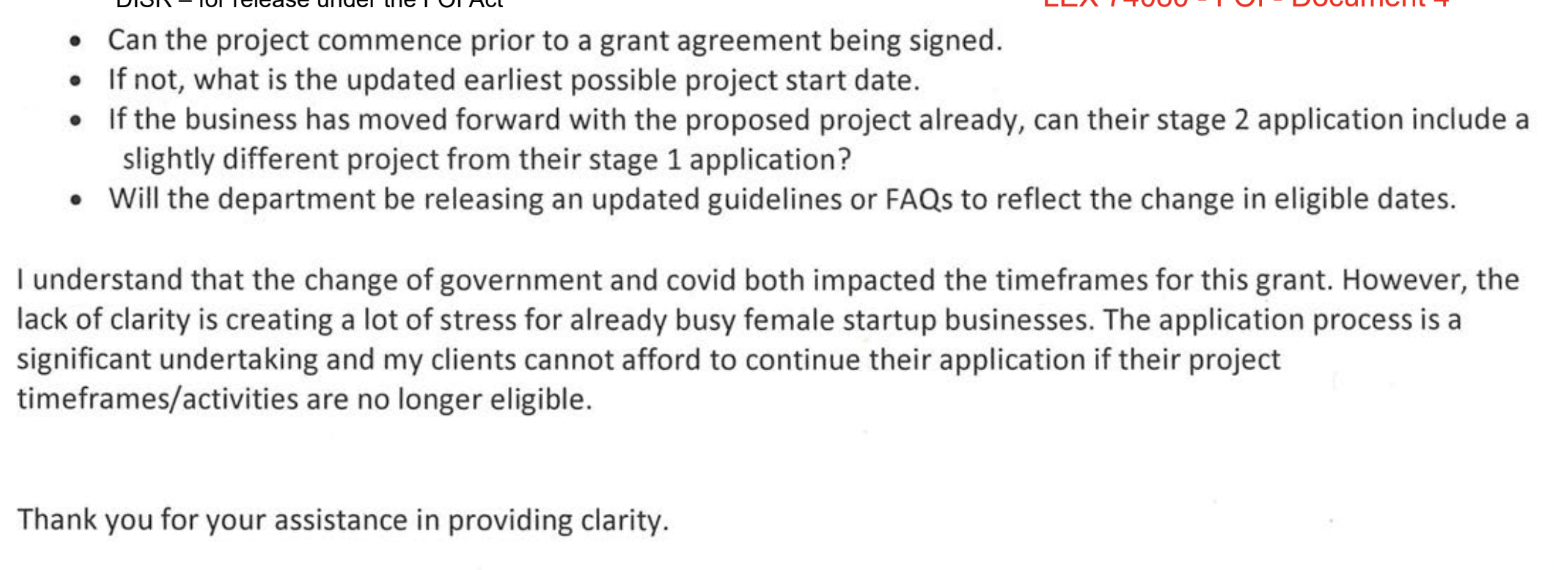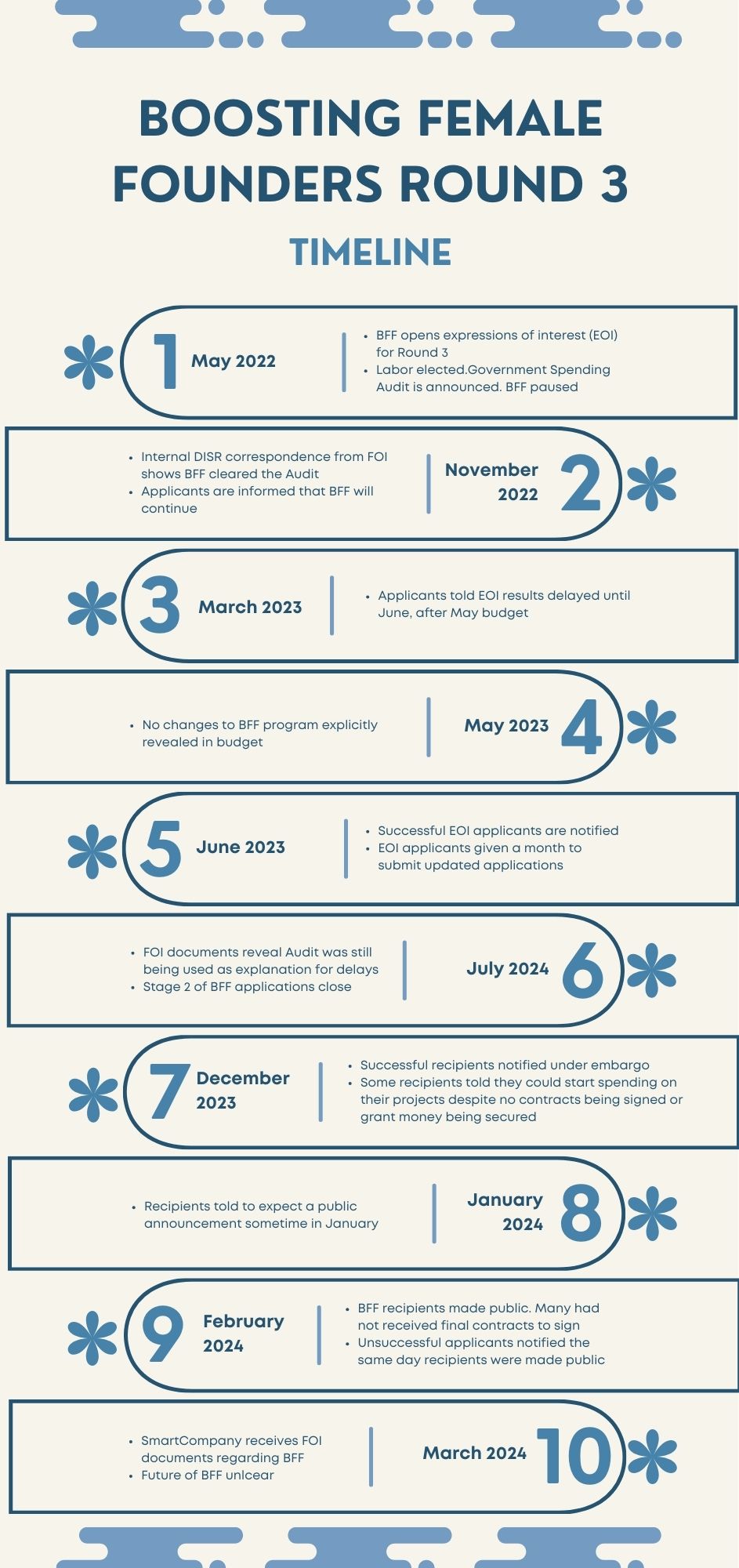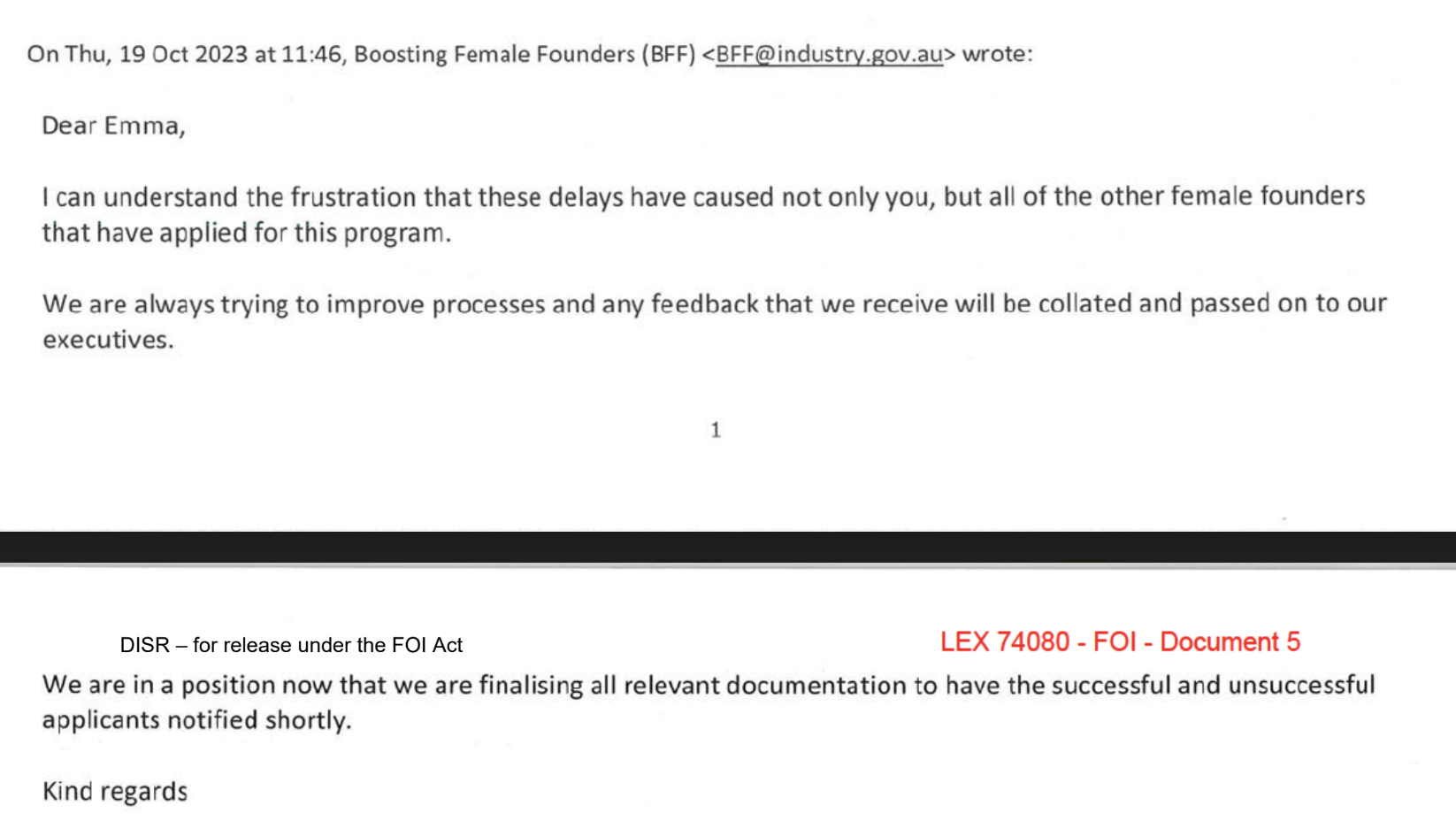
Image: SmartCompany
The federal government continued to blame a wide-reaching spending audit for delays to the Boosting Female Founders (BFF) program eight months after it knew the multimillion-dollar scheme had escaped the chopping block.
Documents obtained exclusively by SmartCompany under the Freedom of Information Act (FOI) also show startup founders were concerned they did not have enough time to supply vital information once their applications finally progressed.
The revelations shed new light on a program that was designed to assist women in the startup space, but has been plagued by setbacks and what applicants call a frustrating lack of clear communication.
Boosting Female Founders was launched in 2020 by the Morrison government under the remit of the Department of Industry, Science, Energy and Resources, and has continued under the Albanese government and the Department of Industry, Science and Resources (DISR).
BFF offers grants valued between $25,000 and $480,000 to startups that are majority-owned or led by women. Its intention is to “help women entrepreneurs overcome the disadvantages faced in getting access to finance and support to grow their startups”. In terms of direct financial backing, it is the biggest government-led project that directly supports women founders, and it was created to help support women business leaders and entrepreneurs in an environment where the vast majority of venture capital funding goes to men.
While things have improved since 2020, data from the latest State of Australian Startup Funding report found only 12% of funding went to all-women founding teams in 2023.
The BFF scheme has been riddled with problems since its inception — from government representatives falsely telling applicants they were accepted into the next stage; ‘doxxing’, or revealing, the personal email addresses of hundreds of applicants without their consent; and excluding some married applicants after attributing their businesses to their husbands.
But Round 3 of BFF has perhaps been the most contentious of all.
The Audit excuse
The biggest problem of Round 3 of BFF — the one that every other feeds into — has been the delays.
Many founders who applied for the program have spoken publicly and privately about the issues the almost two-year round caused them.
Expressions of interest for the round opened in May 2022 and were supposed to conclude in October of the same year, with successful applicants moving onto ‘stage two’.
Successful applicants were set to receive grant funding from February 2023.
But the May 2022 federal election, and the victory of the incoming Labor government, complicated the Round 3 timeline.
Soon after taking office, Minister for Finance and Minister for Women Katy Gallagher announced a wide-reaching government spending audit, tasked with investigating funding pledges made by the previous Morrison government.
Starting in late 2022, DISR began informing women founders that the Round 3 application process was delayed.
“Following the 2022 Federal election, the Government announced the Government Spending Audit (The Audit) to ensure its investments are targeted and aligned with policy priorities,” one email said.
“The initiative was considered under the Audit and as a result, Round 3 has been delayed.”
Ahead of the October 2022-2023 federal budget, Gallagher revealed the audit had identified $22 billion in potential budget savings across “every single department” of the government.
The BFF program appeared to escape the chopping block.
However, in March 2023, a month after successful applicants were set to receive grant funding, DISR confirmed to SmartCompany the government spending audit process continued to delay Round 3 payouts.
Publicly and privately, applicants began to share their concerns about the Round 3 grant process.
As the grants were offered on a “co-contribution” basis, some feared that third-party investors could pull out of their projects if the matched funding did not materialise.
Those concerns snowballed further into 2023.
Still, DISR continued to blame the audit for delays.
Communications between DISR and an applicant, obtained by SmartCompany under the Freedom of Information Act (FOI), show department officials blamed the audit for delays as late as July 2023.

Further internal DISR communications, obtained by SmartCompany, suggest the department knew the BFF program had cleared the government’s audit in late 2022.
“Now that Boosting Female Founders (BFF) has cleared the Audit of Wasteful Spending, could we arrange a time to discuss BFF?” wrote one DISR representative in November 2022.
“I would be happy to arrange for the team to give you a rundown on the program, current state of play with round 3.”

An internal email regarding BFF and the Government Spending Audit obtained through FOI.
This suggests DISR was still using the audit as a reason for the delays, a full eight months after it learned the BFF program cleared the government’s spending crackdown.
DISR declined to comment on why the audit was still being given as a reason for BFF Round 3 delays in July 2023.
SmartCompany understands the expression of interest phase for BFF Round 3 closed on June 2, 2022, with 697 applicants, before the program came under the microscope of the government audit.
Until that point, no merit assessments had taken place. These commenced after the government spending audit was concluded.
This included initial assessments by the department, as well as a final assessment by an independent committee and the program delegate.
It’s quite an undertaking, and internal resources may have been a contributing factor to the slow approval process.
While the department has a dedicated team that works on BFF, the number of people within that team changes, depending on departmental resourcing needs.
To be clear, applications have been fully processed for those chasing earlier rounds of the BFF program.
The 87 applicants who made it through to Stage 2 of BFF Round 3 were notified in June 2023, with a July 2023 deadline to get their next round of paperwork in. — should this be Round 3?
The second stage of assessments then took place between July and November 2023.
FOI reveals more applicants were left hanging
According to the FOI documents, at least one applicant was still left confused by the communication around the stage two dates.
An email from a member of the grants team was sent to the applicant at 5.22pm on July 18, 2023, congratulating them on their invitation to submit for stage two of Round 3. It also reminded the applicant that the deadline for submissions was 5pm AEST on July 20, 2023.

Email from the department to a stage 2 applicant in July 2023.
Responding to the email the same evening, the applicant alleged they only had two days to complete the next round of their application due to poor communication from the department.
“…this is the first notification we have received about our EOI being approved and now we have less than 2 days to submit a stage 2 application,” the applicant said.
“I have been in touch multiple times with the government to ask for status updates and each time they told me that we would be notified of next steps by email.”
According to the applicant, they had seen their expressions of interest application (EOI) had been accepted via the BFF online grant portal, but had not received an email notification.
“I have been refreshing daily and contacted the government multiple times only to be told to look out for an email advising us of next steps,” the applicant said.
“It’s been over 1 year seen our EOI application and now we have 2 days?”

An email from a Boosting Female Founders applicant regarding communication around Stage 2 applications in July 2023. Source: FOI documents.
This isn’t the only example of alleged mixed messaging in the FOI documents. In an email to the department on July 15, 2023, one applicant claims to have been told that there would be a back-date period to July 2o23 for expenses that could be claimed as part of BFF if applicants were successful.
“This information is critical to us as our cash flow is low and we have placed all expenditures on hold relating to our project in the hope of being able to claim them as part of our co-contribution source funding,” the email read.

Email from BFF applicant to the department in July 2023. Source: FOI documents.
A second email, dated July 17, also asked if they could backdate expenditure due to the “extensive delay to this grant”.
In a response from the department, the representative said successful applicants would be able to backdate their ‘project start date’ (and therefore expenditure) to the “date they are notified that their application is successful”.
“However, this will not be as early as the 20th July 2023,” the response read.

Email from the department to an applicant in July 2023. Source: FOI documents.
The origin of the confusion around when project start dates can be backdated can be found in an email from a grant writer to the department in June 2023.
Working on their client’s submissions for stage 2 of the application process, they found that the eligibility forms — which came directly from the government’s grant portal — stated that the eligible start date for BFF projects was from February 2023.
While this oversight was likely due to the program delays, it did clearly cause additional confusion and frustration for applicants who were holding onto matched funding and not executing projects vital to their businesses due to the delays and mixed communication coming from the department.


Email from a grant writer to the department in June 2023. Source: FOI documents.
Unsuccessful applicants were supposed to be notified in December 2023
A point of contention surrounding the eventual announcement of Round 3 recipients of BFF was that unsuccessful applicants weren’t notified until February 7, 2024. This was almost two months after successful applicants were notified.
This was also 21 months after EOI was opened for this round of BFF. As multitudes of women founders have expressed across a year on reporting on this, it’s an incredibly long time to be sitting on matched funding. Particularly when you are ultimately unsuccessful.
One applicant, who spoke to SmartCompany on condition of anonymity, recalled being told by a member of the grants team in February — just days before BFF recipients were announced — that they didn’t know why there were still delays or when anything would be made public.
“I cannot imagine any scenario where the person who leads the program team doesn’t know why it’s been delayed and doesn’t know when we’re going to hear anything,” the source said to SmartCompany.
“This kind of stuff would not fly in a commercial environment. You would be fired. You can’t operate a program in that fashion.
“It’s just absolute nonsense and the worst possible management of a project I’ve ever heard of”
Making those applicants wait an extra two months seems strange, and the FOI documents reveal this may not have been the original intention.
An email from the department to an applicant in July 2023 (the same email as above that discusses the Government Spending Audit), said there were plans to inform successful and unsuccessful applicants around the same time.
“We are hoping to notify successful and unsuccessful applicants in November/December 2023.”
Instead, unsuccessful applicants were notified via the grant portal on February 7, after the successful grant recipients were published on business.gov.au. SmartCompany understands they were also emailed on the same date.
DISR did not specifically comment on why there was such a large gap in communication between successful and unsuccessful applicants.
“The Boosting Female Founders Initiative aims to help women entrepreneurs to grow their startups and scale into domestic and/or global markets. The initiative involves a competitive grant process which does not guarantee success,” a DISR spokesperson said in an email to SmartCompany.
“The Department notified applicants of updated timelines and was in contact with applicants during the stage 2 application process. We acknowledge the frustration delays can cause applicants.”

Image: SmartCompany
However, not all applicants got the memo. One unsuccessful BFF applicant, who wished to remain anonymous, claims to have not received this communication. They were unaware the recipients had been announced and were unable to find communication from the department. The first they heard of their unsuccessful application was allegedly from this publication.
According to the source, the amount of work put into their BFF application and subsequent matched fundraising required roughly 80 hours of pro bono work. They now feel like they have no explanation for the length of time the application process took or an explanation for what happened.
“It makes it really hard to go back to [partners] when it’s gone round and round in circles,” they said.
“It’s embarrassing to go back and say ‘we had no idea’.”
They referred to the handling of the program as “unprofessional” and that it “didn’t send signals of confidence”.
“Its hard enough as a woman in this business landscape without this crap,” they said.
“Breaking Female Founders”
This source is just one of many who have spoken about their negative, and in some cases, almost business-ruining, experience with BFF since 2022.
As we have reported repeatedly over the past 12 months, the significant delays with the program and ad-hoc communication left many disillusioned with the program. And due to the significant amount of matched funding that was a requirement of applying, it also left many in financial dire straights.
“I heard that it’s become known as ‘Breaking Female Founders’,” said Emma Jones, founder and CEO of Project F, on a call with SmartCompany.
Jones was one of the applicants who made it to stage 2 of BFF Round 3, but found out she was unsuccessful in February. She was also prominently featured in the FOI documents, allowing her name to not be redacted from the documents.
Jones’ emails reflected the frustration of many founders embroiled in this process. They show her asking when they can expect to hear any new information, bringing up the matched funding issue, and asking for proactive communication from the department.

Email from Emma Jones to the department in October 2023. Source: FOI documents.

Email from the department, responding to Emma Jones in October 2023. Source: FOI documents
According to Jones, and many others in a similar position, BFF has done more harm than good for women in the Australian startup and business communities.
“Whichever way you look at it, it’s a disaster. There is no positive out of this, even for the people who were successful, and congratulations to them,” Jones said.
“But even for them — the fact that it’s been delayed, is causing them issues, like some serious problems. Hiring people and then not knowing when the funding is coming, having been told it was coming. That’s just shocking.”
Jones is referring to the revelation — reported exclusively by SmartCompany in February — that some grant recipients were told in December 2023 that they were able to start spending in order to execute on their proposed BFF projects.
While they were told that contract negotiations and the first part of their funding was supposed to land in January 2024, they were still waiting when the identity of the recipients was made public by the government on February 7.
Sources speaking to SmartCompany at the time said they were in real danger of losing their businesses because of this delay. We understand these businesses have now received the funding.

Email from Emma Jones to the department in November 2023. ource: FOI documents.
As for Jones, she’s unsure if she will be able to get access to the matched funding that was promised to her for the grant — money she could have taken for the business over 18 months ago, but held off on for the sake of the grant.
“The worst case scenario is [BFF] cost me $120,000,” Jones said.
Jones also brought up the reason this program was initially started: to give women more access to funding in a country where such a small percentage of funds go to women. That number shrinks even further for founders who are women of colour.
“And that was the purpose of this grant – supposedly to give women access to funding and it has made it worse,” Jones said.
“I would love to see an inquiry or investigation internally and the people responsible to be held accountable. That’s what I like to see as an outcome.”
As for the future of Boosting Female Founders, it’s unclear. At present, there have been no decisions made around future rounds of the program.
Handpicked for you

Boosting Female Founders FOI documents doxxed an applicant and government worker



COMMENTS
SmartCompany is committed to hosting lively discussions. Help us keep the conversation useful, interesting and welcoming. We aim to publish comments quickly in the interest of promoting robust conversation, but we’re a small team and we deploy filters to protect against legal risk. Occasionally your comment may be held up while it is being reviewed, but we’re working as fast as we can to keep the conversation rolling.
The SmartCompany comment section is members-only content. Please subscribe to leave a comment.
The SmartCompany comment section is members-only content. Please login to leave a comment.